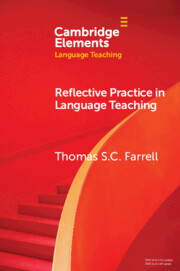Refine search
Actions for selected content:
34 results
Chapter 6 - Darwin’s Lost Legacy
-
- Book:
- Darwin's Philosophy of Emotion
- Published online:
- 18 December 2025
- Print publication:
- 22 January 2026, pp 163-184
-
- Chapter
- Export citation
5 - Moral Imagination
-
- Book:
- Moral Imagination in the Twenty-first Century
- Published online:
- 30 October 2025
- Print publication:
- 13 November 2025, pp 97-123
-
- Chapter
- Export citation
Chapter 6 - John Dewey, Humanism, and the Value of Science
- from Part II - Inspirations
-
-
- Book:
- Science and Humanism
- Published online:
- 09 October 2025
- Print publication:
- 23 October 2025, pp 126-146
-
- Chapter
-
- You have access
- Open access
- HTML
- Export citation
Chapter 8 - The Pragmatic and the Religious Functions of Science
- from Part II - Inspirations
-
-
- Book:
- Science and Humanism
- Published online:
- 09 October 2025
- Print publication:
- 23 October 2025, pp 172-194
-
- Chapter
-
- You have access
- Open access
- HTML
- Export citation
2 - Defining an Industry
-
- Book:
- Spinning the World
- Published online:
- 03 July 2025
- Print publication:
- 24 July 2025, pp 39-61
-
- Chapter
- Export citation
3 - Human Action
-
- Book:
- Democracy for a Sustainable World
- Published online:
- 12 June 2025
- Print publication:
- 05 June 2025, pp 83-122
-
- Chapter
- Export citation
6 - Rowing the Triremes
-
- Book:
- Democracy for a Sustainable World
- Published online:
- 12 June 2025
- Print publication:
- 05 June 2025, pp 185-216
-
- Chapter
- Export citation
Bringing emotions into post-Northian institutional economics: a reading inspired by John Dewey
-
- Journal:
- Journal of Institutional Economics / Volume 21 / 2025
- Published online by Cambridge University Press:
- 19 May 2025, e20
-
- Article
-
- You have access
- Open access
- HTML
- Export citation
7 - Philosophy
-
- Book:
- Charles Darwin
- Published online:
- 05 December 2024
- Print publication:
- 28 November 2024, pp 116-142
-
- Chapter
- Export citation
10 - American Pragmatism, Democratic Ethics, and Education
- from Part I - Traditions in Ethics and Education
-
-
- Book:
- The Cambridge Handbook of Ethics and Education
- Published online:
- 07 March 2024
- Print publication:
- 14 March 2024, pp 186-212
-
- Chapter
- Export citation
8 - Moral Education in the Virtues
- from Part I - Traditions in Ethics and Education
-
-
- Book:
- The Cambridge Handbook of Ethics and Education
- Published online:
- 07 March 2024
- Print publication:
- 14 March 2024, pp 145-165
-
- Chapter
- Export citation
14 - American Pragmatism: An Essayistic Conception of Truth
- from Part II - Voicing the American Experiment (1865–1945)
-
-
- Book:
- The Cambridge History of the American Essay
- Published online:
- 28 March 2024
- Print publication:
- 14 December 2023, pp 235-249
-
- Chapter
- Export citation
Chapter 12 - Pragmatist Moral Education
- from Part II - New Approaches to Moral Education
-
-
- Book:
- Moral Education in the 21st Century
- Published online:
- 01 June 2023
- Print publication:
- 15 June 2023, pp 210-228
-
- Chapter
- Export citation
25 - Disability and Democratic Education
- from Part Three - Key Topics and Concepts
-
-
- Book:
- The Cambridge Handbook of Democratic Education
- Published online:
- 20 April 2023
- Print publication:
- 27 April 2023, pp 416-432
-
- Chapter
- Export citation
Chapter 6 - Emma and Other Minds
-
- Book:
- Jane Austen and Other Minds
- Published online:
- 04 November 2022
- Print publication:
- 27 October 2022, pp 161-199
-
- Chapter
- Export citation
Chapter 6 - Questioning the Science and Religion Question
- from Part II - Beyond ‘Science and Religion’
-
-
- Book:
- After Science and Religion
- Published online:
- 05 May 2022
- Print publication:
- 19 May 2022, pp 155-170
-
- Chapter
- Export citation

Reflective Practice in Language Teaching
-
- Published online:
- 22 April 2022
- Print publication:
- 19 May 2022
-
- Element
- Export citation
4 - Bringing Community Back In
-
- Book:
- Political Science and the Problem of Social Order
- Published online:
- 17 March 2022
- Print publication:
- 24 March 2022, pp 67-87
-
- Chapter
- Export citation
Chapter 23 - The Uncertainties of Theory
- from Section B: Civil Liberties and Civil Rights
-
- Book:
- The Hughes Court
- Published online:
- 13 January 2022
- Print publication:
- 03 February 2022, pp 551-564
-
- Chapter
- Export citation
From “What” to “How”: Experiential Learning in a Graduate Medicine for Ethicists Course
-
- Journal:
- Cambridge Quarterly of Healthcare Ethics / Volume 31 / Issue 1 / January 2022
- Published online by Cambridge University Press:
- 20 January 2022, pp. 131-140
-
- Article
- Export citation
